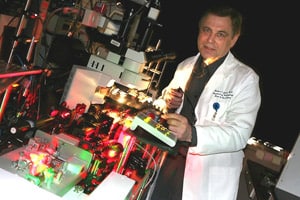
The excitement of discovery and the satisfaction of applying that knowledge to patient care are the driving forces to our research. Both basic and clinical research are fundamental to the mission of the Department of Otolaryngology — Head and Neck Surgery at UAMS. Our basic science and clinical researchers strive to find the cure for head and neck cancer, deafness, tinnitus, thyroid cancer, allergy, vascular anomalies, and other otolaryngic diseases. The department’s research division is funded by the National Institutes of Health, the American Cancer Society, the National Science Foundation, the National Space Biomedical Research Institute, NASA, several private foundations and private industry. Our Investigator also initiated clinical protocols in Head and Neck Disorders.
The Clinical Research Division also supports many investigator-initiated studies. These studies include research into tinnitus, lip carcinoma, leukoplakia (5ALA), adenoid cystic carcinoma of the salivary glands, pediatric airway vascular lesions, otorrhea, thyroid cancer and other diseases of the thyroid, and vocal cord paralysis.
Otology Research
Our cochlear implant program, one of the major implant programs in the country, has been funded via several mechanisms through collaborations with the UAMS Department of Neurobiology. We are currently conducting funded research in the transcranial magnetic stimulation lab on mechanisms of tinnitus control and plan to transition to mechanisms of neuromodulation after cochlear implantation.
Neurovestibular Research
Neurovestibular research examines both provoked and existing conditions that affect the vestibular apparatus. An example of a provoked condition would be spinning in a rotary chair to simulate the effects of space motion sickness. A study funded by NASA through the National Space Biomedical Research Institute has examined appropriate drug countermeasures for space motion sickness in anticipation of a mission to Mars.
Research into Meniere’s disease, a debilitating disease associated with hearing loss, tinnitus, and vertigo, involves animal studies, studies of endolymphatic sac tissue, and a research forum held biannually for the Prosper Meniere Society.
TMS Lab
Tinnitus affects a huge number of individuals, and 25 million people in the U.S. seek medical attention for this affliction each year. The theory of tinnitus generation is unknown, and its treatment remains elusive. Most recent research suggests that, while tinnitus is generated peripherally, its perception and propagation is a central phenomenon. John Dornhoffer, M.D., together with Mark Mennemeier, Ph.D., (also at UAMS), have assembled a team of investigators to study the effects of TMS on tinnitus. They have developed repetitive TMS (rTMS) for the treatment of tinnitus and have shown that approximately half of tinnitus sufferers respond. Of these treatment responders, they have been able to elicit a more lasting response using maintenance TMS, indicating that the tinnitus condition can be manipulated. In addition to publishing their findings, they have authored a book chapter describing important principles related to measuring tinnitus and response to rTMS. This research may ultimately have applications in patients with cochlear implants.
UAMS Center for Hearing Health Access
Directed by Susan D. Emmett, M.D., MPH, and Samantha Kleindienst Robler, Au.D., Ph.D., the center’s primary focus is on research into hearing loss disparities, in an effort to improve access to care for people, particularly children, in underserved areas. The research aims to identify those who are at risk of developing hearing loss or are already experiencing it but haven’t been diagnosed, and help them easily access affordable preventive care and treatment.
The center is the only one of its kind in the world and is home to research conducted by two multi-center networks. The Global HEAR (Global Hearing Loss Evaluation, Advocacy & Research) Collaborative is an international research network that includes a multidisciplinary group of investigators from 28 countries, and HEAR USA has six sites as the United States HEAR Collaborative branch. Both collaboratives are dedicated to reducing disparities in hearing loss across the country and worldwide.
Visit the UAMS Center for Hearing Health Access website.
Nanomedicine Research
Vladimir Zharov, Ph.D., is director of the Arkansas Nanomedicine Center at the Cancer Institute and full professor in our department. Over the past few years, he has received two R01 grants from the NIH, including a $1.5 million grant for his work with photoswitchable nanoparticles circulating in blood for diagnosis and treatment of diseases and a $1.7 million grant from the NCI for clinical testing of a new technology for the early diagnosis and treatment of melanoma (using melanin nanoparticles and photoacoustic flow cytometry). He is also co-leader for two of the EPSCoR projects funded by the National Science Foundation (Experimental Program to Stimulate Competitive Research).
Research at Arkansas Children’s Hospital
Ongoing projects include universal hearing screening related to otoacoustic emissions, novel laser effects of papilloma, novel treatment of otitis media with CO2 laser effusion, and post-operative pain in patients undergoing tonsillectomy and adenoidectomy.
